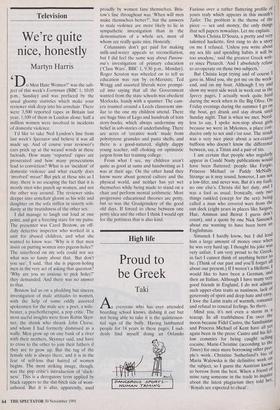Television
We're quite nice, honestly
Martyn Harris
Do Men Hate Women?' was the sub- ject of this week's Everyman (BBC 1, 10.05 p.m., Sunday) and was prefaced by the usual gloomy statistics which make your reviewer sink deep into his armchair. There were 3,500 reported rapes in Britain last year, 1,100 of them in London alone; half a million women were involved in incidents of domestic violence.
I'd like to take Neil Lyndon's line from last week's Spectator and believe it was all made up. And of course your reviewer's ears prick up at the weasel words in these factoids. How many 'reported' rapes are prosecuted and how many prosecutions lead to conviction? What is an 'incident' of domestic violence and what exactly does `involved' mean? But pick at these nits as I may, there is no escaping the fact that it is mostly men who punch up women, and not the other way around. The reviewer sinks deeper into armchair gloom as his wife and daughter on the sofa stiffen in sisterly soli- darity at the brutishness of the other sex.
I did manage to laugh out loud at one point, and got a freezing stare for my pains. The presenter was Carol Bristow, an off- duty detective inspector who worked in a unit for abused children, and what she wanted to know was: 'Why is it that men insist on putting women into pigeon-holes?' The sisterhood on my sofa could not see what was so funny about that. 'But don't you see', I said, 'that she is pigeon-holing men in the very act of asking that question? `Why are you so anxious to pick holes?' they demanded. And there was no answer to that.
Bristow led us on a plodding but sincere investigation of male attitudes to women, with the help of some oddly assorted spokesmen for the male sex: a poet, a wife- beater, a psychotherapist, a pop critic. The most useful insights were from Robin Skyn- ner, the shrink who shrank John Cleese, and whom I had formerly dismissed as a wally. Men grow up on one bank of a river with their mothers, Skynner said, and have to cross to the other to join their fathers if they are to grow up. But the tug of the female side is always there, and it is in the fear of self-loss that hatred of women begins. The most striking image, though, was the pop critic's introduction of 'slack- ness'. This is a derogatory term applied by black rappers to the slut-bitch side of wom- anhood. But it is also, apparently, used proudly by women fans themselves. Bris- tow's line throughout was 'When will men make themselves better?', but the answers to male violence are more likely to lie in sympathetic investigation than in the demonisation of a whole sex, most of whom are really quite nice. Honestly.
Columnists don't get paid for making milk-and-water appeals to reconciliation, but I did feel the same way about Panora- ma's investigation of primary education (`Class Wars', BBC 1, 9.30 p.m., Monday). Roger Scruton was wheeled on to tell us education was run by ex-Marxists; Ted Wragg and assorted liberals were prompt- ed into saying that all the Government wanted from the state schools was obedient Morlocks, handy with a spanner. The cam- era roamed around a Leeds classroom sim- ilar to the one my children attend. There are huge bins of Lego and hundreds of torn story-books, which always undermine my belief in sob-stories of underfunding. There are acres of 'creative work' made from polystyrene granules and pasta shells, and there is a good-natured, slightly dappy young teacher, still choking on optimistic jargon from her training college.
From what I see, my children aren't quite as good at sums and handwriting as I was at their age. On the other hand they know more about general culture and the physical world, and neither has yet wet themselves while being made to stand on a chair and perform mental arithmetic. Most progressive educational theories are potty, but so was the Gradgrindery of the good old days. If forced to chose between one potty idea and the other I think I would opt for the pottiness that is also kind.










































































 Previous page
Previous page